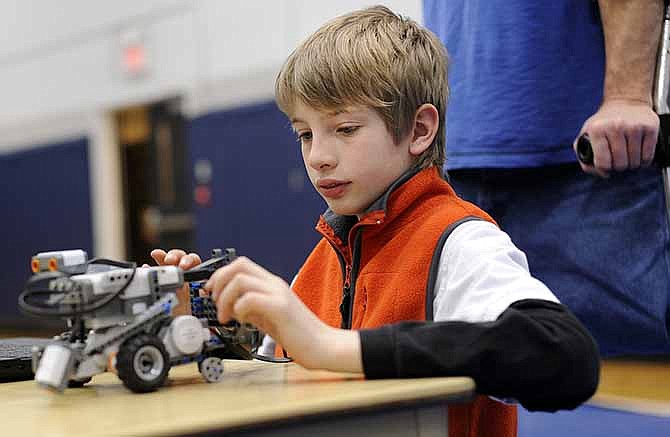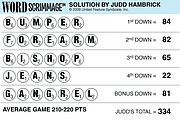Teams of local children showed off their robotics skills Saturday at the RoboFest competition at Lincoln University.
What was meant to be a competition, pitting several robots against each other to see which one could best perform the outlined task, became more of an exposition Saturday, allowing local groups to show the robots they had built.
Annette Alberts, one of the organizers of the event, said they had difficulty getting enough teams to sign up for the actual RoboFest challenge and decided to simply invite local groups to show off their robots.
The RoboFest challenge itself, which only one team took part in, was meant to simulate a nuclear plant meltdown. The participating team had to successfully program their robot to take tennis balls, symbolizing water, and drop them into a cardboard box, which represented a power plant. The robot also had to knock over two batteries, which represented barriers to the plant itself.
David Hawcroft, 13, Robbie Cline, 12, and Colin Matherly, 9, were the only children to participate in the challenge. Their team, which came out of the 4-H Tech Club robotics program, spent most of Saturday afternoon putting the final touches on their program to get their robot to complete the challenge.
Cline said the group struggled at first because each of them had different ideas on what their robot should be.
"At first we did have a little bit of teamwork issues," Cline said.
Matherly said it was a difficult task, especially because he didn't know much about robotics before joining the team.
"It was a bit of a stressful task," Matherly said.
But all three said they had fun with the project and it felt good to accomplish the task and complete the challenge. Cline, who was the programmer of the team, said they used a robotics kit that uses a simple program, adding that he found it very easy to use.
Patrick Ashley and his son, Cameron, 11, showed their robot Saturday, which also came out of a 4-H project. Cameron said he built the robot, with his dad's help, which was a very complicated task. Patrick Ashley said the two were using Saturday's event as a workshop to continue fine-tuning Cameron's project.
Greg Pierson also attended Saturday's event, with two of the members of Perpetual Recursion, a team taking part in For Inspiration and Recognition of Science and Technology, or FIRST. Pierson, a team mentor, said the team consists of nine members, from ages 13 to 18, and they take part in robotics challenges in St. Louis. Teams are given six weeks to build robots that meet the criteria of the challenge, and Pierson's team took the opportunity to show off their robots Saturday.
The team brought two robots, one that essentially threw racquetballs and another that launched an enormous red ball. Pierson said the team recently returned from competing in a challenge in St. Louis.
He said the children involved take the project one step at a time and he is amazed to see how smart and talented they are in their work.
"It's amazing to see what they are able to do," Pierson said.


